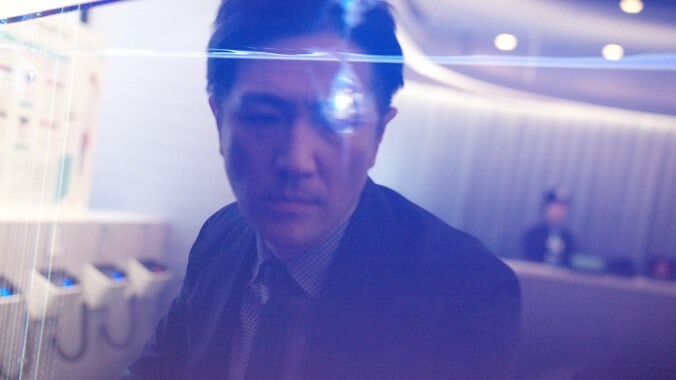Werner Herzog explores the strange business of rented relatives in Family Romance, LLC


Werner Herzog is one of few major filmmakers whose work is rather equally split between fiction and nonfiction: Over half a century, he’s steadily churned out both documentaries and narrative films, sometimes even making one of each on the same topic. With his latest project, Family Romance, LLC, Herzog comes closer than maybe ever before to finally just combining the two approaches within a single film. His subject is a Japanese company that allows clients to “rent” substitute friends and family members, i.e., actors that will play whatever role in your life you need filled. To explore this phenomenon, the director casts CEO Yuichi Ishii as himself, following him around with a lightweight camera, shooting in the style of a vérité documentary. Yet every scene and encounter is also plainly scripted, going far beyond the usual bends in veracity (like staging certain conversations) that Herzog makes in his docs. This is sometimes called constructed nonfiction, and for Herzog, it may be another attempt to capture the elusive “ecstatic truth” he once spoke of—the kind that can only be revealed through some blend of the real and the fabricated.
The approach theoretically suits the subject matter. Herzog, after all, is examining a livelihood that very explicitly blurs the boundaries separating reality from simulation of the same. Family Romance, which is essentially a non-sexual escort service, caters to a wide swath of needs, and so we see the employees occupy various roles—taking the blame for a client’s workplace mistake by pretending to be the responsible party; masquerading as the father of a bride because her actual father has a destructive drinking problem; even getting fitted for a coffin, to play the guest of honor at a wake without a body. (Strange as it sounds, Family Romance—which is named for a Freudian thesis—is not the only game in town. Social surrogacy is apparently a growth industry in Japan, in part because of a purported loneliness epidemic.)
Ishii, as it turns out, isn’t just CEO of the business but also among its most popular “performers.” Though Herzog reenacts several of his weirder assignments, the plot revolves around one job in particular: playing the estranged father of 12-year-old Mahiro (Mahiro Tanimoto), who doesn’t remember her real father and hence has no idea she’s being mislead. (Nor would a viewer going in cold, for that matter—the film opens with a reunion between her and “Dad,” the truth of the arrangement only revealed a few minutes later.) Remarkably, that story element is plucked straight from Ishii’s résumé; he’s spoken before about a similar long-term gig, upholding the lie of parentage even as his faux-daughter has grown up and gone off to college. Which, of course, raises all kinds of questions, ethical and logistical. How can he and the girl’s mother keep up the charade when her social circle keeps growing? Aren’t they afraid that she’ll be destroyed if she ever finds out? How could anyone afford to keep paying for an indefinite father experience?
Basically the public face of his whole bizarre industry (he’s even appeared in a Conan O’Brien episode, which hints at the possible Sacha Baron Cohen problem of becoming too recognizable to don disguises), Ishii has been candid in interviews on his conflicted feelings about the work. One does wonder if his insistence that the business is altruistic at heart—he’s sworn that the goal is to render his services obsolete by helping clients recover or grow emotionally—is just a justification for what is, essentially, lying for a living. Yet even when the plot turns to its subject’s second thoughts about his profession, Family Romance, LLC doesn’t much broach his contradictions or psychology. Nor does hiring someone who plays other people to play himself on screen prove especially illuminating: Perhaps aware that he’s representing his company, too, Ishii comes across like a polite cipher.
Maybe there’s a point to that. If your job often entails faking emotions and forging phony relationships, will there come a time when you cease to be yourself, when you forget who you really are? But though Herzog builds this whole gently offbeat hybrid film around Ishii, he seems less interested in the man and more in the larger notion that all of modern life is a performance, and that there’s an element of role-playing in all relationships. We know this because the dialogue often bluntly underscores that idea. When, for example, Ishii discovers that Mahiro has misled him about where a particular Instagram photo was taken, Herzog can’t just let the implications speak for themselves—he has to force his protagonist to say aloud, “We’re both lying to each other.” At times, too, the director seems to compensate for the absence of his signature voice-over editorializing by turning his subjects/actors into mouthpieces. While visiting a hotel staffed by lifelike robots—one of a few sequences that seems like it belongs in one of Herzog’s more diffuse big-subject documentaries—Ishii asks, “In the future, do you think they’ll have dreams?” It’s hard not to hear the words in the director’s oft-parodied Teutonic accent.
Throughout, Herzog maintains a quizzical distance, marveling at the strangeness of this stranger-than-fiction business without ever quite grappling with it. Despite the meta framework, the film isn’t half as revealing as a three-year-old interview with Ishii in The Atlantic, nor the in-depth piece in The New Yorker on the trend. Perhaps the mixed-modes strategy wasn’t the right one for this material after all. A less conceptually slippery dramatization could complicate the unusual professional-personal relationships, unencumbered by the need to stay true to Ishii’s real-life experiences. Conversely, a more straightforward documentary might address the bigger questions Herzog barely grazes in fictionalization. Family Romance, LLC straddles the line between the two tacts and finds no ecstatic truth there. Like those eerily blinking robots manning the concierge desk, it’s stuck in an uncanny valley.